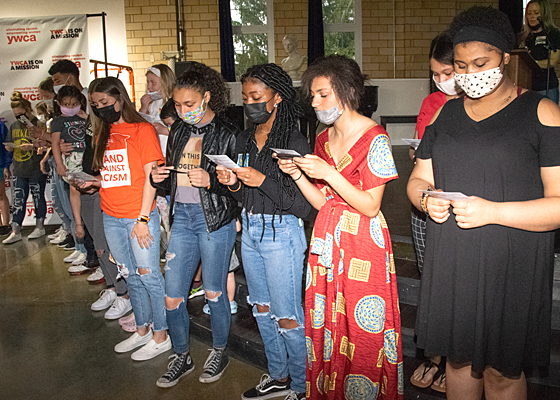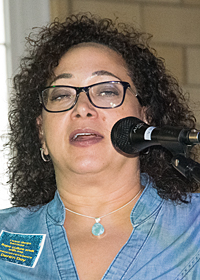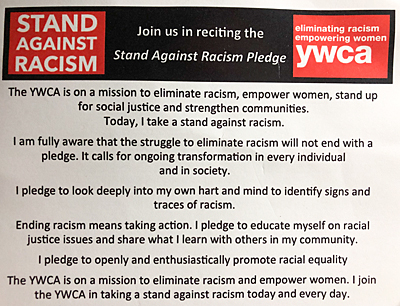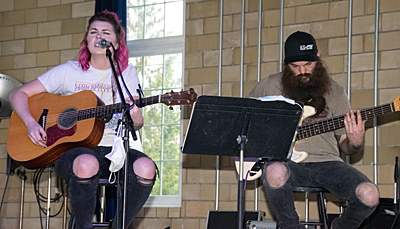YWCA holds Stand Against Racism event
DAVE MOSIER/independent editor

It’s been more than a year since the YWCA’s last Stand Against Racism event, and Director of Advocacy Kelly Houg knew that, compared to a pandemic, a little rain wasn’t going to stop this one from happening.
Following a last-minute switch from the Wassenberg Art Center’s Art Park to the center itself, Houg welcomed the approximately 100 masked area residents, both old and young, who attended the event, which was held in conjunction with the YWCA’s mission that it is dedicated to “eliminating racism, empowering women, and promoting peace, justice, freedom, and dignity for all.”
The event included poems written on the subject of racism by three local students — Dru Johnson, Macy Johnson, and Olivia Ramos — music by Kaitlyn Schmit and Frank Stemen, and a keynote address by Van Wert Municipal Court Judge Jill Worthington-Straley.
“Stand Against Racism is an opportunity for us to unite our voices to educate, advocate, and promote social justice,” Houg said.
Judge Worthington, the child of a “mixed” (interracial) marriage, talked about her experiences with racism growing up. From the physical education teacher in school taking attendance on the basis of race, to parents of classmates who didn’t want their children playing with her because she came from a mixed-race family.
“As a child, I struggled to understand why someone would just not like me because of the way I looked,” she noted, “when I didn’t feel the same way about them.”

Judge Worthington said she continually struggled against being pigeonholed as one race or another.
“I’ve always known that I was both, and I’ve never accepted the idea that I could only be one or the other,” she told the audience.
The judge’s childhood experiences with racism led her to purposely no check the “race box” on her application to law school.
“I reason why was I didn’t want anyone to say that the only reason I got into law school was because of my race or color,” the judge said.

In fact, to her, the idea of race is really a moot issue, at this point in time.
“Race, as we know it, isn’t real,” Judge Worthington said, explaining that genome decoding has shown that all members of the human race share 99.9 percent of their genetic information, while adding that there is more genetic diversity among the populations of Africa itself than there are between Africa and the rest of the world.
Judge Worthington also talked about privilege, for whatever reason (race, sex, nationality, religion, or any other identifier), as well as the terms institutional (systemic) racism, which is part of the national discussion now, and interpersonal racism.
Noting that privilege means never having to worry about whether you can go somewhere or do something because you are the “wrong” race, gender, nationality, religion, or whatever, while interpersonal racism, for example, is a manager not wanting to hire a Black person because of his or her opinion that Black people don’t work as hard as someone who is white.
Systemic racism is embedded into the policies of this country, the judge said, and gave the example of a company having a policy of not accepting job candidates from certain schools — which just happened to have predominantly Black students. While not overtly personal, having such a policy is still a covert (hidden) way to turn down eligible Black candidates.
Judge Worthington also gave a definition of race created by Dr. Camara Phyllis:

“Racism is a system of structuring opportunity and assigning value based on the social interpretation of how one looks (which is what we call “race”), that unfairly disadvantages some individuals and communities, unfairly advantages other individuals and communities, and saps the strength of the whole society through the waste of human resources.”
The judge also told at the event that racism in any form cannot, and should not, be tolerated.
“Our challenge today is that, once you do know better, that you act, and you cannot forget,” she said, adding that not being racist is not enough, because that infers neutrality and silence is conforming.
Judge Worthington said people have to be anti-racist, since being anti-racist embraces the idea that all racial groups are equal; that there is nothing right or wrong about any of them, and that any racism must end.
The judge concluded by noting that diversity should be America’s strength, not one of its greatest problems.
“In this world, diversity should not be our downfall,” she said, while urging the audience to stand up right then against racism.
Later, those attending read the YWCA Stand Against Racism pledge (see above).
POSTED: 04/29/21 at 1:01 am. FILED UNDER: News







